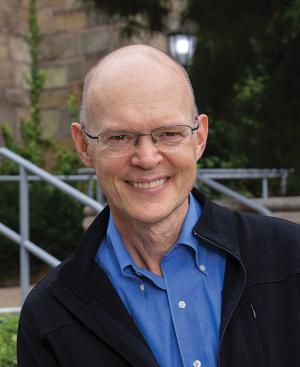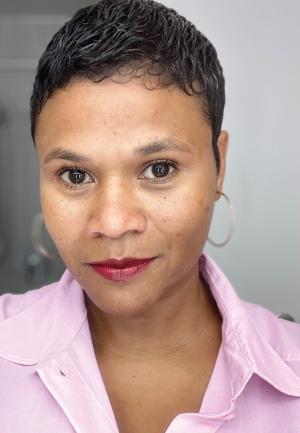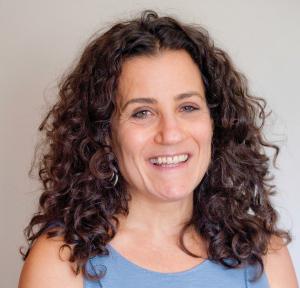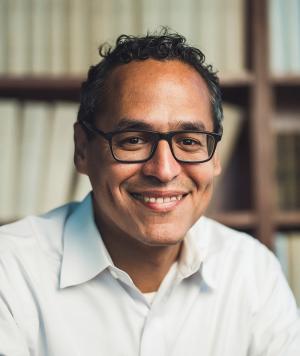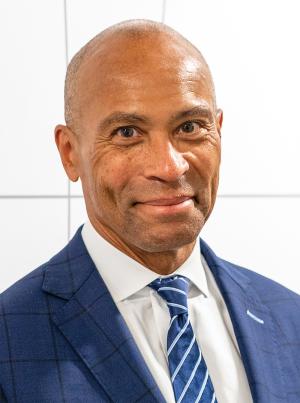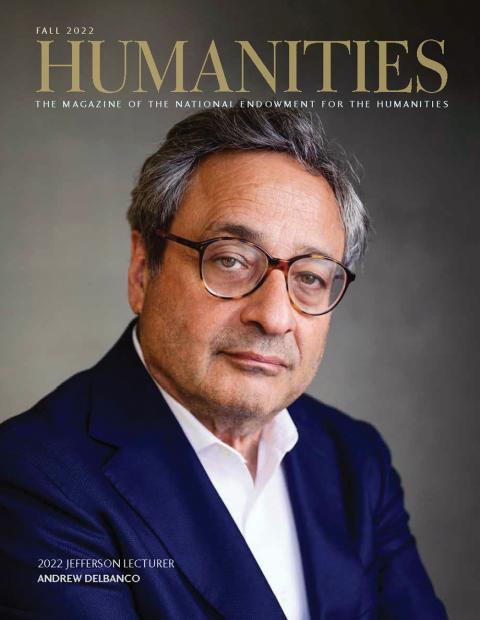James Bundy
For five semesters at Harvard College, I was a desultory, even discouraged, English major. That changed in 1979, when I heard Andrew Delbanco lecture in English 70; his energy and wit inspired me to ask him to guide my junior spring tutorial in the novels of Herman Melville. Andy graciously added that responsibility to his schedule (while finishing his dissertation on William Ellery Channing). Going above and beyond, he galvanized my autonomy and accountability as a learner.
Now I can see that Andy combined mastery of a subject with the inclination to foster discussions more about perception and less about being right. Unfailingly kind, he met me where I was, encouraging me to take chances while challenging me to bring evidence to bear as I built a case. When I was less on my game, he made me feel like trying harder.
Andy’s love of novels was uplifting in itself. With no interpretive axe to grind, he showed me it was possible to combine a passion with ever-deeper inquiry. The combination of his enthusiasm and Melville’s imagination somehow communicated to me that it was possible to find places where artistry, the intellect, and the soul might all come together—if not in absolute harmony, then in a kind of cacophonous joy and fulfillment.
I treasure Andy’s scholarship, providing a steady stream of books through which I can still experience his luminous erudition, humanism, and originality. Even more, I value the opportunity to pay forward the priceless gift of the hours spent with him as an undergraduate. When thinking now about the best environments for faculty and students to fulfill their promise, I often find myself reverse engineering from my own experience at the age of twenty and tapping into the strategies of Andrew Delbanco.
James Bundy is Elizabeth Parker Ware Dean of the David Geffen School of Drama at Yale and artistic director of the Tony Award-winning Yale Repertory Theatre, where his directing credits include Hamlet, with Paul Giamatti in the title role, and Happy Days, starring Dianne Wiest. A graduate of Harvard College and the Geffen School of Drama at Yale University, he also trained at the London Academy of Music and Dramatic Art. —Photo by T. Charles Erickson
Janine de Novais
One day, when I was a student in Professor Delbanco’s Foundations of American Literature class at Columbia University, he appeared to have the beginning of a cold. It was the day he was due to teach Melville, and he declared belligerently that the show must go on. It did, and it was a show. As Delbanco lectured, he removed layer after layer of clothing. He did so slowly at first, then frantically, like he feared the fever might hit before he could finish. It didn’t. The fever held off, and Delbanco lectured brilliantly, even as his signature growl sounded a little delirious by the end. It was a genuine experience of how much he loved teaching us, how seriously he took our importance and the importance of the enterprise. When I took that class, my lifelong dream of pursuing my own “life of the mind” was getting away from me fast. Ten years out of college, a single mom in New York City, it was hard to feel capable of doing much more than raising my son and paying my bills. It was hard to see myself anymore. In that class and in mentoring me afterward, Delbanco saw me and reminded me that the picture was still bright. That spring, I felt brave enough to apply to graduate school, and he was kind enough to write me a letter of recommendation—a crucial vote of confidence I needed. So many people write and teach without the faintest notion that, ultimately, the purpose of teaching is to make a country, a classroom, a moment, a person feel more human. Delbanco gets it in his bones, and that is why he is a treasure.
Janine de Novais is a writer and scholar who explores the intersection of race, culture, and democracy. Her book Brave Community: Teaching for a Post-Racist Imagination (Teachers College Press) will be published in 2023. — Photo by Jalen Kai
Rachel Friedman
Andy’s classes were among the most impactful I took in college. This might sound surprising coming from a classics professor, but I remember vividly how electrified I felt in his classroom and have often joked with him that had the stars aligned differently, I might have ended up with a dissertation on Melville and a PhD in English. I came to college from a parochial background, and in my yeshiva high school there wasn’t much interest in the new; the focus was always backward-looking, on the reverential preservation of the past. In Andy’s classes, I learned how to think, for the first time, about the American project and the impetus to create something new while grappling with the legacy of what’s been left behind. My turn to classics was, of course, also a turn to the past, but when I think about where I’ve ended up intellectually and where my scholarly passions have led me—to the study of Caribbean poet Derek Walcott’s epic poem, Omeros, and its relationship to Homer—I can draw a direct connection to the kinds of inquiries I first learned to pursue in his classroom. I’ll never forget a comment he wrote on one of my papers. After responding to the content of what I had written, he asked, simply, “Are you going to pursue this further?” In that question he opened up a space for me to think of myself as someone who could pursue scholarly work beyond college—beyond the classroom and the work required of me for one paper—and, in doing so, he gave me a gift for which I will always be grateful.
Rachel Friedman is a professor of Greek and Roman studies at Vassar College. Her book, H/Omeros: Walcott and Homer, Homer and Walcott, is under contract with Oxford University Press. —Photo by Karl Rabe
Roosevelt Montás
I took my first class with Andy almost 30 years ago, in the fall of my senior year at Columbia University. His course on the foundations of American literature transformed the way I thought about America. It taught me how to read old texts, alert to the light they shed on what it means to be American. Toward the end of that semester, I went to his office to talk about my interest in graduate school and maybe ask for a letter of recommendation. In the measured but earnest manner I have come to know well, Andy offered support but asked probing questions that showed how uninformed I was about the field. Afraid to push my luck, I walked away without asking him for a letter.
I managed to get into Columbia’s English doctoral program and enrolled right after graduation. At first, I avoided Andy, embarrassed by the feeling that I had gone behind his back by applying to graduate school. But I couldn’t stay away long. I had arrived at Columbia bewildered, awkward, and deeply out of place. Andy had been one of the few people who saw me. He didn’t always—he didn’t usually—tell me what I wanted to hear. But he saw me. And that was the most transformative thing he did for me: He looked at me, and he saw me.
In graduate school, when it came time to write a dissertation, Andy read my initial proposal and, alone among my prospective advisers, raised fundamental questions about the project. His sober and unpatronizing critique was proof that he took my ideas seriously. Abandoning the project, I determined that whatever dissertation I wrote, I wanted to do it under his supervision.
As a teacher and mentor, Andy has been a model for principled defiance of the stylized gestures and intellectual vacuity common in academic discourse. His impact on who I am as a teacher, scholar, and citizen is greater than I can properly acknowledge.
Roosevelt Montás is senior lecturer in American studies at Columbia University and director of its Freedom and Citizenship Program, which introduces low-income high school students to the Western political tradition through the study of original texts. He is the author of Rescuing Socrates: How the Great Books Changed My Life and Why They Matter for a New Generation (Princeton University Press, 2021). —Photo by Inbal Sivon
Deval Patrick
I first met Andy in the fall of 1975, when he, the teacher, was 23, and I, the student, was 19. I have the impression that he has been thinking about and working on The War Before the War since at least that time. His research is first rate: precise, thorough, and wide-ranging, driven by deep curiosity about the way people lived and thought in their times. He shows the discipline of a first-rate lawyer as well, getting to the essence of some of the holdings and the reasoning of key court decisions, and the circuitous proceedings that led to them, without oversimplifying the subtleties of the positions taken on either side. Most of all, his humanism comes through in the unprepossessing, down-to-earth observations he makes about the experiences and feelings of runaways or freedmen and how they connect to the experiences and feelings of Black men and women in America today, the emotional investment we make in America’s ideals and the depth of the disappointment or fear or just unease we sometimes feel about America’s own commitment to those ideals. He is really remarkable. Andy was the first person to make me consider the idea that America was envisioned as a nation with a conscience, and that there were (and are), as a result, certain unresolved issues that our national conscience won’t let us put to rest. I am grateful to count him among my best teachers and dearest friends.
Deval Patrick was the governor of Massachusetts from 2007 to 2015. He is currently the codirector of the Center for Public Leadership at the Harvard Kennedy School. —Photo courtesy of Harvard Kennedy School


